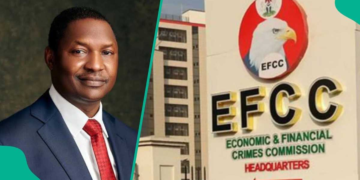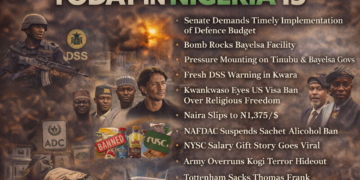Bayelsa State, known as the birthplace of Nigeria’s oil industry, has been grappling with environmental pollution and degradation for over six decades due to oil and gas exploration activities. The extractive activities of International Oil Companies (IOCs) and indigenous oil firms have resulted in devastating consequences for the environment, livelihoods, and public health in the region.
To address the issue of environmental justice, former Governor Seriake Dickson established the Bayelsa State Oil and Environmental Pollution Commission in 2019. After four years of extensive research, the commission released its final report titled “An environmental genocide: Counting the human cost of oil in Bayelsa, Nigeria” on May 16, 2023. The report highlights the scale of pollution and its impact on communities.
The commission, led by former Anglican Archbishop of York, John Sentamu, and comprising distinguished members, documented the oil spills and environmental damage caused by oil exploration and pollution. It revealed that Bayelsa recorded 25% of all oil spills in Nigeria between 2006 and 2020, with the state experiencing a spill every 12 hours for 14 years.
The report attributed the problem to a failed regulatory regime, with environmental standards not being ensured and overlapping roles in relevant agencies. It also criticized the inadequate penalties imposed on oil companies for gas flaring and recommended a comprehensive clean-up of Bayelsa and a recovery plan for the affected communities.
The report said, “Bayelsa recorded 25 per cent of all oil spill in Nigeria between 2006 and 2020; 3,508 oil spill out of 13,251 oil spill; 234 oil spill in Bayelsa per year with most in Southern Ijaw, Yenagoa and Nembe Local Government Areas; 109,940 barrels of oil spilled in Bayelsa and 88 per cent from five IOCs’.
“In 2018, the Federal Government increased the penalty for gas flaring from N10 per 1,000 standard cubic feet (scf) to $2 per 1,000 scf of gas flared. Furthermore, various legislative measures to curb gas flaring in Nigeria have been in place since 1969. Currently, companies producing more than 10,000 barrels per day pay a fine of $2 per 1,000 scf of gas flared, while those producing less than 10, 000bpd pay $0.5 per 1,000 scf of gas fared,” the report stated.
The report indicated that several health studies have documented the connection between gas flaring and a range of chronic diseases including bronchial, rheumatic and eye conditions alongside hypertension. It stated further that constant inhalation of sulphur dioxide causes nose and throat irritation and shortness of breath, adding that prolonged exposure to flared gas has been associated with cancer and neurological, reproductive and developmental effects.
The report added, “The flares harm and disperse local wildlife and are associated with numerous ecological problems. In Ogboinbiri, Tebidaba, Southern Ijaw, Agip operates 24-hour gas flaring cycles. In Nembe Creek I, II and III, Oporoma and Gbarain, the SPDC continually flare gas. The Gbarain-Ubie gas processing plant (belonging to the SPDC) is a major concern.”

“The injustice must be attended to for justice to prevail. The people deserve to live in wealth. The wickedness to the people must stop to give room for a new lease of life. The oil companies need to clean up the mess as recommended by the report.
“The commission recommends concerted international action to generate and invest at least $12bn over the course of 12 years to repair, remediate and restore the environmental and public health damage caused by oil and gas, and lay a foundation for a transition towards renewable energy and opportunities for alternative livelihood in a new Bayelsa.”
“The injustice must be attended to for justice to prevail. The people deserve to live in wealth. The wickedness to the people must stop to give room for a new lease of life. The oil companies need to clean up the mess as recommended by the report.
“The commission recommends concerted international action to generate and invest at least $12bn over the course of 12 years to repair, remediate and restore the environmental and public health damage caused by oil and gas, and lay a foundation for a transition towards renewable energy and opportunities for alternative livelihood in a new Bayelsa.”
The panel’s findings underscore the need for accountability and actions to address the long-standing environmental challenges caused by oil and gas activities. The report called for international support and investment to remediate the environmental damage and create opportunities for alternative livelihoods in the region.
However, some of the oil majors operating in Bayelsa disputed the report’s credibility, claiming they were excluded from the process. They attributed most oil spills to third-party interference, including oil theft and sabotage. The companies assured that they respond promptly to clean up when spills originate from their facilities.
The challenge now lies in the implementation of the commission’s recommendations by the Bayelsa State government to achieve environmental justice and address the concerns of the affected communities. The report serves as a clarion call for action to protect the environment and the well-being of the people in the Niger Delta region.

Agip Oil Reacts
The management of Nigerian Agip Oil Company, in a statement by its parent company, Eni, dismissed the allegations of being culpable in oil pollution around its assets and facilities in the state.
It stated, “We do not attribute any value to a report for which we have not been consulted, and made by a commission that, despite its name, does not have any institutional character.
“In Nigeria, over the last 10 years, almost all the hydrocarbon spills are due to so-called “third-party interference”, which specifically means oil theft, to feed illegal refineries as well as illegal exports and sabotage.
“The company undertakes to remedy in all cases, both when spills are both operational and due to theft or sabotage. The trend of spills in the region decreased over the last few years, also thanks to the important interventions carried out by Eni to guarantee the asset integrity, among other things.”
The oil giant said about 97 per cent of associated gas produced by NAOC was processed either as liquefied natural gas or used to feed local power plants. “Okpai produced approximately 2,000 GWh of electricity in 2022,” it added.
It said further, “Eni conducts its activities according to the sector’s international environmental best practices without any distinction on a country basis. There is nothing further from our corporate culture than allegations of environmental racism.”
Shell Reacts
SPDC’s Media Relations Manager, Mrs Bola Essien-Nelson, attributed many of the pollution incidents within its operations to vandalism and oil theft.
She stated, “SPDC operates to the same technical standards as other Shell companies globally. Illegal actions by third parties cause the vast majority of oil spills in the Niger Delta, such as crude oil theft and sabotage.
“However, regardless of the cause, the joint venture responds quickly to clean up when a spill originates from its facilities. Our teams continue to collaborate with the Nigerian government and other stakeholders with the aim of eradicating crude theft from our facilities.
“We try to stop criminal actions happening in the first place, putting steel cages around some well heads and using helicopters to monitor for attacks on pipelines. Shell companies in Nigeria also bring jobs, support local supply chains and invest in the education and healthcare people rely on, as well as providing billions of dollars in income to the Nigerian government.”

































